Lost in Translation One Hundred and Eighteen
January 4, 2018
09:59 AM
Síle gave me “Dent’s Modern Tribes” for Christmas which investigates modern working slang and codes.
One was the army’s use of “Mess” for a place where food is served.
Dent explains that “Mess” originally meant any food, as in the Scottish; “going for the messages” when going shopping- as indeed we use the same expression in Irish/ English.
This in turn made me wonder about the French “Entremets” for dessert and yes indeed I discovered from my “Larousse Etymologique” that food put on a table was known as “Mets” and sure enough when I dip into the OED Shorter there is “Mettre”; ” to place”, given as the root of “Mess”.
Somewhere in the back of the old brain lurks the expression “A mess of pottage” which perhaps wasn’t such an awful thing after all, most likely it was simply a dish of fresh vegetables from the “Potager” or vegetable garden.
l’Homme Mort
December 6, 2017
15:34 PM
.jpg)
The lonely Cypress stands on top of a rise just across from where Síle and I take our constitutional.
The field in which it stands is called l’Homme Mort in the local GR map- I had no idea why until today.
I posted the picture on Facebook and retired journalist Seamus Martin- who also has a house out here, told me that locals had told him that Protestants who were killed during the 100 years war were not allowed be buried in the catholic graveyard so were buried alone in a field where their friends would plant a Cypress in their memory.
So it is not just a lonely Cypress but a solitary grave.
Cork Christmas Revisited
December 5, 2017
11:20 AM
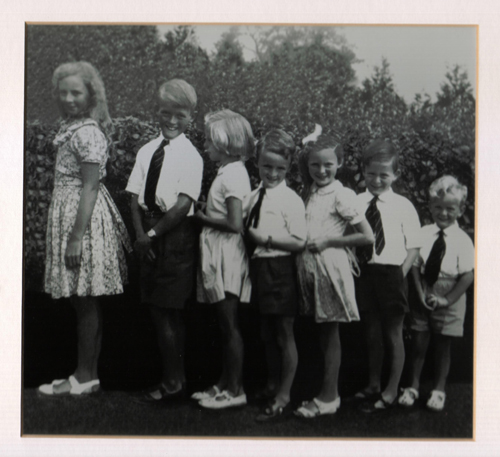
My brothers and sisters and I in the early fifties
Deirdre George Valerie David Fifi Teddy and Martin
We always went to Lotaville for lunch on Christmas day.
Lotaville was my fathers family home, a stately Victorian Villa in Glanmire, overlooking the river Lee about 3 miles outside Cork city.
It was what they call a “Gentleman’s Residence”, in about two or three acres of gardens, including a disused tennis court and large greenhouses where we were allowed pick the delicious black grapes in September.
The house itself was quite large but without a lot of bedrooms, probably about four or five , but these were huge.
It also had a tower built in on one side, a piece of Victorian/Gothic whimsy which could only be scaled inside by a series of ladders, and which the boys were allowed climb after lunch on Christmas day.
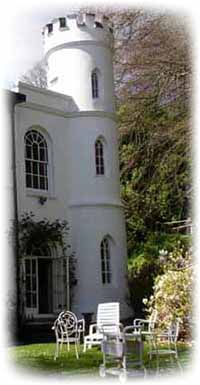
The tower at Lotaville
The inhabitants of the house were an odd lot to my young eyes too.
The head of the house (we would always have described a trip there as going to Granny Dwyers) was my Granny.
She was small and round and, as far as I was concerned, permanently cross.
My elder sister remembers someone quite different, someone warm who spoiled her, but, by the time I got to know her life had squeezed most of the joy from her, and, as the seventh child, the best emotion I could expect from her was tolerance.
My grandfather we called Dubs, he and Granny lived totally different lives within this house. Their marriage was endured not enjoyed, it was a type of early Irish divorce.
As well as having his own bedroom, Dubs had his own drawing room, a large brown masculine room with large windows overlooking the river.
This he shared with various small dogs of whom he was very fond.
He was also fond of his grandchildren and I remember always feeling welcome when I entered his room.
Granny’s Drawing room was at the end of the corridor but also looked over the river. In contrast with Dubs room it was feminine and chintzy with carpet and curtains in pale greens and pinks.
Granny shared this room with two other members of the household. Auntie Gill and Auntie Kat.
Auntie Gill was my father’s only sibling and 18 years his junior.
She was at this stage in her mid twenties, unmarried and, even to my eyes strangely old fashioned. I would also have rated her as cross and could see that she was interested only in the older children.
Auntie Kat on the other hand was kindness itself, it was obvious that like the younger children she was tolerated rather than loved and as such there was an unspoken bond between us.
She was a classic maiden Aunt, my Granny’s unmarried sister and she was shared between Granny’s household and that of her younger sister in a farm in Mitchelstown. It was always obvious to me, from the way she used to talk about the farm and the family there, that that was her favoured billet and she enjoyed her stays in Lotaville as little as Granny and Auntie Gill did.
Auntie Kat smoked “like a chimney”, she always had a Woodbine in the corner of her mouth and her cloud of white hair had permanent brown nicotine stain in that place where the smoke ascended.
The other member of the household, and to me much the most interesting was Lena.
Lena was the cook and her kingdom was in the large, dark basement kitchen.
Lena was an old retainer and as I remember her quite lame, she got about with some difficulty using a stick.
This did not stop her doing all the cooking and ruling over the girls who had been brought in for serving on Christmas day with an iron hand.
She was a kindly lady though and would tolerate us children “under her feet” for short periods.
These visits to the kitchen would have to be organised with some skill as it was strictly forbidden to go “annoying Lena” before lunch on Christmas day.
Despite all embargos I can still remember being put by her up on a chair in the kitchen to better see her making the bread sauce for the turkey.
I still have a memory of the delicious smell of the milk infusing with an onion studded with cloves, as Lena grated stale bread with which to thicken the sauce.
The lunch itself was not my favourite part of the day.
For all Lena’s kindness the food was much better at home.
The younger children were put at a small side table and, under orders to behave well, fed apart from the adults.
I can remember a certain amount of jollity at the large table, I can remember the surprise I felt when granny allowed a paper hat from a cracker to be put on her head.
I presume that Dubs would also have broken out of his part of the house and joined us for lunch, even though I have no memory of him being there.
I would hate anyone to think that Christmas day was not a happy day for me.
It was in fact a day full of magic, the lunch in Granny’s being just a formal and perfectly acceptable hiatus in the middle of a joyous day.
Santa Claus, and his stocking were a great source of joy when my eyes first opened on Christmas morning.
I would have lain for hours in the bed, too excited to sleep and knowing that “He” wouldn’t come until I did.
The morning stocking was always filled with cheap toys and sweets and always had a silver wrapped tangerine at the toe.
Unlike other households Santa didn’t provide the main Christmas presents for us.
This was reserved for the “Christmas Tree”
“The Tree” as we called this time was, without doubt the highlight of Christmas day.
After morning mass, for those who were reckoned too young to be allowed up for midnight mass, we had breakfast in the breakfast room which was next to the billiard room.
The billiard room was the biggest room in the house, large enough for a billiard table but as yet not holding one.
There was no decorating done to this room until after the younger children had gone to bed on Christmas eve.
Then it was transformed.
There was a large amount of ceremony attached to “The Tree”
We all had to line up in age at the door to the billiard room.
This was the one time of the year when the youngest took precedence.
Then once we got into the room itself we had to join hands and dance around the tree singing “Here we go round the mulberry bush”
This does sound just a little twee in 2005 but I promise you that in the fifties there was no embarrassment whatsoever.
The tree was put in the middle of the room, decorated with lights and the shiny glass balls which rested for the rest of the year in the attic in boxes.
But it was what was under the tree was what made the magic of this moment.
Here were piled all our presents.
This was what “The Tree” was all about.
Again tradition dictated that you were not allowed pick or open one of your own presents. Anything with “To Martin” on it, no matter how tempting, had to be passed by and one picked out one for George or Valerie.
Eventually you ended up with a sizeable pile of presents in the corner and then there was the excitement of unwrapping and glorying in your new found wealth.
I never remember being disappointed.
Then it was off to Granny’s for lunch.
When we came back from Granny’s we would find the Billiard room again completely transformed this time for Christmas Dinner.
The tree would be re-erected in the bow window in the corner and the floor covered with trestle tables covered with white linen.
To my childish eyes it seemed that these tables were set for hundreds of people but I now suppose that it couldn’t have been more than forty or so.
These would have been members of my mothers large family, and my mother and fathers equally large circle of friends.
There would be various extra staff recruited for the night so, for us children it was difficult to decide where the most fun was going on, in the billiard room or in the kitchen.
In direct contrast to the staid and old fashioned lunch the dinner was a bit of a bacchanalia.
I can remember that we were allowed smoke, yes us 8 to 10 year olds were allowed to puff away!
I can also remember that much drink was consumed by my various uncles.
I have a distinct memory of someone’s paper hat being ignited and then the flames quenched by another uncle with a soda water siphon.
In the meantime there would have also been much hilarity and drink consumed in the kitchen, I can remember a steady stream of uncles and aunts arriving in with bottles to make sure that the “staff” were able to celebrate as well.
Stephens day was “The Wran” and we would be allowed dress up in rags and sing outside our neighbours houses, passing others up to the same tricks on the way.
“The Wran the Wran
The king of all Birds
St Stephens day
Was caught in the furze
Up with the kettle
And down with the pot
Give us our answer and let us begone”
“Knock at the knocker ring at the bell,
Give us a copper for singing so well”
“God bless the mistress of this house
A golden chain around her neck
And be she sick or be she sore
The lord have mercy all the more”
And we would be given lots of coppers and this money, unlike the money we would have collected for carol singing the week before, was for ourselves and so, once we were finished we would divide the spoils and head off to Mr. Sullivan’s shop on the Lower Road for a gorge of sweets.
As you can see it was easy enough to put up with lunch in Lotaville knowing what other treats Christmas had in store for us.
Christmas Tree
December 2, 2017
16:33 PM
Picture Book
November 26, 2017
08:18 AM
 (2).jpg)
I have, I confess been entirely remiss about keeping the blog up to date for the last month.
Daughter D and I have been busy putting together a book- well a slim picture book- of le Presbytere- before and after. I will stick up some shots when it arrives.
Kilmacleague- reposted from November 2005
November 9, 2017
12:17 PM
This was posted in my blog 12 years ago today and is the story of our house in Kilmacleague County Waterford which we owned between 1978 and 1989 when we moved into our restaurant in Mary Street in Waterford.:
Kilmacleague was the first house we actually owned.
Up to this we had been living, happily, in rented houses in various towns in Ireland , England and even France.
This was supposed to be the moment when we finally put down roots.
Of course it wasn’t what our peers were buying into, suburban and semi detached.
Nor was it a romantic old cottage with stone walls and a cottage garden.
Our house in Kilmacleague was a modern,, bungalow bliss, prefab which had been hurled into the middle of a 1 ½ acre site close to, but out of sight of the sea near Dunmore East in County Waterford.
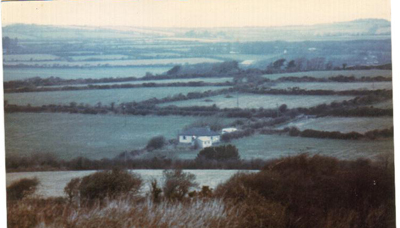
We moved in on Eileen’s second birthday, October the 30th 1981.
Caitriona was 5, and Deirdre was still 15 months away from being born .
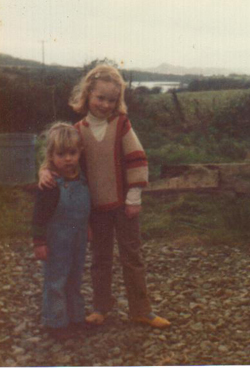
Note water in estuary in background. This meant the tide was in.
Mrs. Ashley, the old woman who sold it to us had moved back to England but had asked us to her going away party before she went- “To meet the neighbours”. A good omen. And the good will lasted .
We were to be extremely happy there.
At that stage I was working in Ballinakill House, a small country house restaurant in Waterford, Sile was in Scoil Lorcain, a primary school also in the town where she still teaches.
Buying a house put us financially at the very brink of disaster.
A larger than normal milk bill was enough to push us close to bankruptcy, and if the calor gas ran out of the cooker at an inopportune time of the month we just shifted cooking the tea out into the garden and continued the operation on a fire of twigs. There was no fear of what the neighbours might think of our conduct, we were surrounded by green fields peopled only by cows and the odd fox.
True we couldn’t see the sea, just a brief glimpse of the estuary when the tide was in, but we could hear it booming gently on the nearby back strand and at night the sky was lit by the regular flashing beams from the lighthouse in Dunmore.
The children loved the country from the beginning.
They were a solitary pair anyway. Not particularly gregarious (unlike daughter number three) they enjoyed their own company and wandering through the fields, making potions from wild flowers, and houses under thorn trees.
The house had its problems, every summer our well ran dry and we had long dry periods of being careful not to flush the loo and borrowing baths from friends.
Not having any money meant that we couldn’t afford booze.
This we remedied by concocting various country wines and beers.
I remember that the Blackberry Wine was successful, I also remember the phenomenal hangovers which the Rose Hip gave us.
We made various attempts to conquer the “garden”.
The truth of the matter was that it needed some heavy machinery to tame it, this would have been way beyond our means. We did plant little bits here and there and on occasions would find traces of the old gardens the Ashleys had planted years ago.If you beat your way through the brambles you could sometimes find raspberry canes and blackcurrant bushes still bearing fruit.
Our neighbours were wonderful, kind helpful and generous.
We were never lonely there, even though it was very isolated.
I suppose the main nostalgia for Kilmacleague is that it was there our girls spent most of their childhood.
It is amazing now to remember the days when all three were bathed together
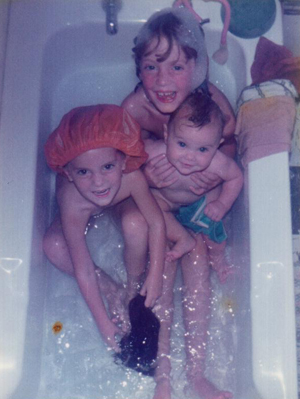
(Sorry Girls)
Or when they went of “Tricking or Treating” to our (few and far between) neighbours.
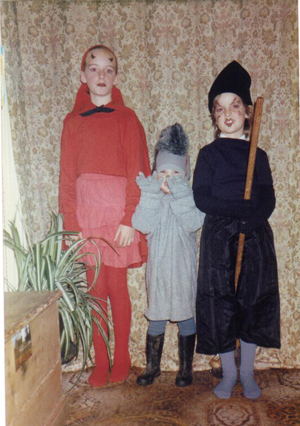
(Deirdre’s costume was a jumper of Sile’s, Caitriona’s school tights and a “Free a Nipper” on her head. She was convinced that she was indistinguishable from a wolf and anxious that she might be too scary for the neighbours)
Even though we never managed to make much of an impression on the garden its very space was a marvellous luxury.
Loads of room for a swing
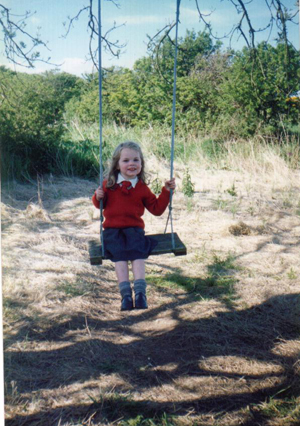
Or for the two older ones to learn to ride bikes.
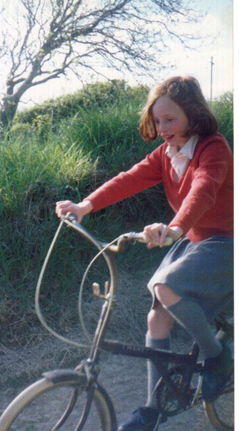 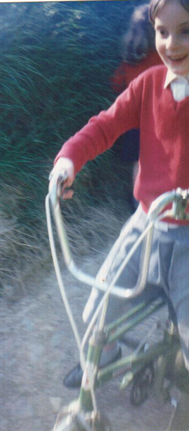
Even the adults managed to enjoy themselves
in a ceidhleidh in the kitchen for my 40th in 1989
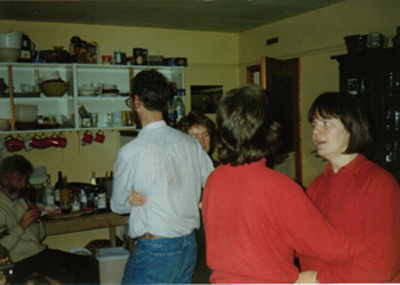
With Sile’s sisters Maire and Una and brother-in-law Padraic on the feadog.
But in late 1989 the prospect of a Restaurant in town raised its head so we decided to pack up and go. It was just getting to the stage that the girls social life was being hampered by living 7 miles out of the town without any public transport. (Except for the Saturday morning bus) and Sile and I were getting rightly sick of being a taxi service.
Sad to go but a perfect house to have a childhood in.
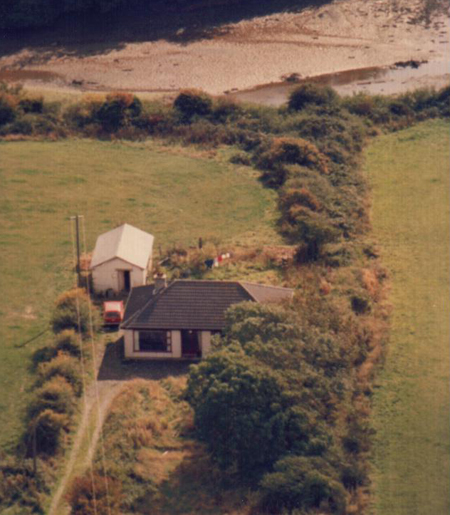
The ubiquitous Ariel View
We often go back for a sentimental wallow.
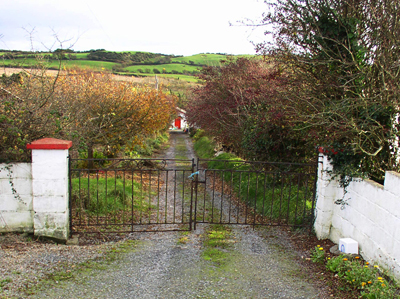
Caitriona took this picture of the gate earlier this year
November 9th 2005.
Prophecy from 1920 Comes True
November 9, 2017
12:11 PM
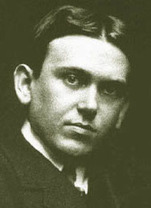
“As democracy is perfected, the office of president represents, more and more closely, the inner soul of the people. On some great and glorious day the plain folks of the land will reach their heart’s desire at last and the White House will be adorned by a downright moron.”
H.L. Mencken 1920
Cooking Mushrooms- 12 years ago today.
October 28, 2017
06:53 AM
I took this directly from my blog 12 years ago, giving a demo in the Ardkeen in Waterford.
Last week I did a cookery demonstration in the Ardkeen Quality Food Store.
I was cooking cultivated “Wild ” Mushrooms which are produce with great care by my friends Nick and Catherine George in Wexford under the name Fancy Fungi.
Kevin Jephson was busy photographing the results
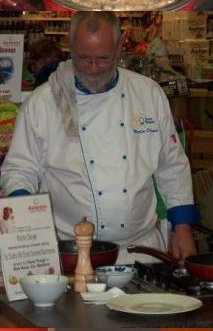 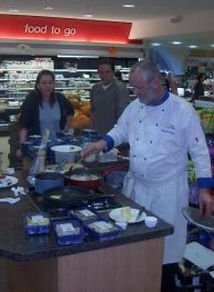
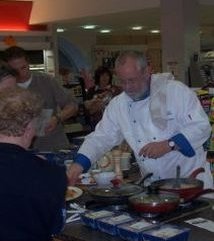 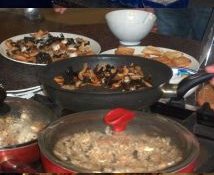
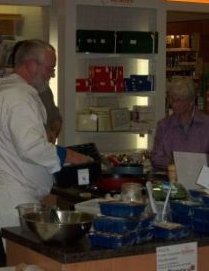 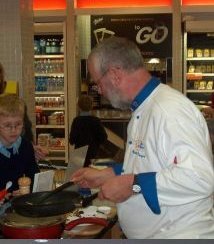
In case anyone is interested these are the two recipes I cooked:
Risotto of Wild Mushrooms, Rocket and Parmesan
(for 4 as a starter,2 as a main course)
1 med Onion
3 oz. Butter
10 oz. Arborio Rice
8 oz. Mushrooms (wild if you can get them)
1 bunch Rocket
2 oz. Piece Fresh Parmesan
2 pts. Good Chicken Stock.
Put the stock on to boil and have it simmering gently on the hob as you cook the risotto.
Chop the onion finely and cook in a large pan in 2 oz. of the butter on a gentle heat until it is soft. (about 10 mts)
Chop the mushrooms into coarse chunks and add them to the pan.
Cook these for 3 mts.
Add the rice to the pan and cook with the vegetables for 3 mts.
Add in a ladle full of the hot stock and cook stirring from time to time until the rice has absorbed the stock . Continue to add the stock a ladle at a time, until the rice is tender and most of the stock has been absorbed.(You may have some stock remaining). The texture should be creamy and flowing, not dry like we are used to eating rice.
Break up the rocket and shave the parmesan with a potato peeler.
Stir these and the remaining ounce of butter into the risotto and serve immediately in flat soup bowls.
This makes a very filling first course so go lightly with the mains.
Wild Mushrooms with Roast Garlic Dressing
450g (1 lb.) Mushrooms
60g (2oz.) Butter
Salt and Pepper
Dressing:
1 Head Garlic
1 Tablespoon Olive Oil
1 tablespoon White Wine Vinegar
4 Tablespoons Cream.
First make the dressing
Don’t be intimidated by the amount of garlic, The roasting softens the taste completely.
Peel the cloves and put onto a oven proof plate with a tablespoon of Olive Oil.
Cover tightly with tinfoil.
Put into a moderate oven Gas4, 175C, 350F, for 30 to 40 mts until they are quite soft.
Put these into a liquidizer and whizz, with their oil and the vinegar, until smooth. Tip out of the liquidizer and when cool beat in the cream.
Slice the mushrooms and fry in the butter until tender.
Arrange them on individual plates as they are or on some toast.
Serve immediately with the dressing dribbled over.
On the Wagon
October 26, 2017
20:14 PM
It was just five weeks ago that my GP here in France told me that, because of my my high blood pressure and the results before her from my last blood test, I should forthwith stop drinking alcohol.
My first reaction was I confess emotional, like being informed of an approaching bereavement. I reckoned that I had entwined my life so closely with alcohol for the last 52 years that to remove it from my life was going to be like losing a very close friend. I had measured out my life not with coffee spoons but with wine glasses.
The great majority of evenings in my life were launched when I had my first glass of wine. When I ran my restaurant in Ireland one of my kindly staff would always have a large glass of chilled white wine ready by my elbow as I served the last main course of the night.
The starting gun, now, here in Languedoc in our Chambre d’Hote, went off at a much earlier 6.00 on most evenings. On work nights, when we had guests eating dinner, 7.30 was Apero time and at the time when we gave our guests their aperitif there was always one in the bottle for me also. Usually that hour before blast off would have had me glancing slyly but frequently at the clock to check my time left in dry limbo.
I really enjoyed that first drink, or two. This was the moment when the wrinkles on the internal brow were smoothed out by alcohol, the moment when all the problems of the day (and god knows I don’t have many) were turned from troubling anxieties into moments of acceptance.
So, I really enjoyed the first couple of drinks, this is true, but did I enjoy any of the many others I downed during the night? I don’t eally know. I do know that I thought that I did, and felt that that initial buzz from drinks one and two would be multiplied proportionately as these numbers increased.
The truth is that in a lot of nights I ceased entirely to count- these would be the nights when a certain forgetfulness would obscure my behaviour from my better self- a lack of memory which would also hide the night from me the following day.
Now I wouldn’t like to give myself too much bad press. The truth is that I usually succeeded being in control and, on nights when we had guests I remained so.
With family or friends this wasn’t always the case that could lead to moments of relaxation, a lowering of the guard and the consequent lost evening and the resulting guilt in the morning.
It would have been easy to blame my father for this, and I frequently and unfairly did. Dad had a troubled relationship with alcohol all his life.
It probably didn’t help that he came from a strictly teetotal family. Legend has it that on his wedding day, to give himself confidence to get through the ordeal of display and speeches he had a friend decant champagne into lemonade bottles which he then poured ostentatiously into tumblers under his mother’s all seeing eye.
But in fairness it was not his Mother who drove him to drink, the real crux of my Dad’s problems with alcohol was that he was a shy man, a man lacking in social confidence and he used alcohol as a crutch to achieve this. He was also someone who suffered from the highs and lows of depression and when high he loved to go against character and be the life and soul of a party, when low he needed alcohol to lift his mood.
Unfortunately for him he was born into a family where a quiet unostentatious life which would have suited him well, was not on the cards. Instead he was born one of Cork’s “Merchant Princes” and by his thirties he was in command of the huge behemoth which was “Dwyers of Cork” employing somewhere around two and a half thousand people between its huge wholesale warehouses and the many manufacturing plants which serviced this.
He was, it must be said extremely good at his job- it didn’t arrive precisely on a silver platter, and there were a lot of hungry first and second cousins jockeying for his position.
But it is also true to say that this whole display of public power didn’t fall easily on his shoulders and he used alcohol more and more to bolster his confidence and fight his related depression as the years went on.
I was the youngest of the seven and my three older brothers and sisters would have suffered differently from my father’s behaviour through the years. As the last I probably saw him at his worst and growing up in the family I felt little or no affection for him. This is of course a great shame but I console myself now with a late few years of mended bridges in our relationship before he died.
But this is not about my relationship with my father but rather about my inheritance from him.
I think that with honest hindsight that I can forgive my Dad’s over indulgence on alcohol far easier than I can forgive my own. I was born with a silver spoon of confidence firmly wedged in my baby teeth and depression was something which I was always to shake off easily, mainly by having a lucky facility to make friends and to always enjoy their company.
It would be good to say that my Dad’s relationship with alcohol had made the Dwyer siblings abstemious but this was not the case, we all enjoy a drink but, in honesty, I feel I did more than the others.
A strange thing about my Dad was that when the plug was finally pulled on his drinking (by the simple expedient of paying his work pension to my mother rather than him) he seemed to accept it without demur and then proceeded to spend the remaining ten years of his life doing crosswords and following racing form from a desk in the living room of my parent’s house in suburban Cork. This seeming unlamented withdrawal from alcohol I also now find significant for my present decision.
So here I am, sixty eight years old, strangely I have just realised very close to my father’s age when he quit drinking, facing my father’s decision and for pretty much the same reasons.
I had, however a couple of differences in style from my father but they were also truly part of his inheritance.
My drinking habits were always coloured, evidentially not coloured enough, by my father’s history. I was always aware of the perilous path I was scrambling on and did try and build in a few safeguards.
I tried to make one night of the week alcohol free (not always successfully) and always sacredly went off drink each year for the month of November. The November fast being the one which bolstered most my feeling of being in control.
But still I was always aware that even though I was a pleasant social drinker I was a fairly disastrous drunk.
So what is it like, five weeks later, thirty six days of being alcohol free?
The answer is surprisingly painless. I am no fool and the realisation had been dawning on me for some time that my days of drinking were numbered. Like my father I had been waiting for someone else to make the decision for me.
Strangely now, over a month later, I don’t feel at all deprived and other than a pang or two about the aperitif hour feel lucky that I feel no pain.
I started writing this piece with an eye to creating a fashionable list as: “Twenty Five reasons why I am happy off Alcohol”- but really this is not what it is all about. I don’t wish in any way to proselytise my new sober state. Everyone, it appears to me, has their own relationship with the demon drink and most are far better able to control this that I was- so I am not at all against alcohol. In fact I look back at my relationship with alcohol with affection and am now happy to realise that it just became time to call it a day.
Safe Depositary
October 23, 2017
12:41 PM
.jpg)
The old wall safe seems to have become a random depositary.
Two Sr Roch’s, 2 Soda Syphons,
Two Blue Bottles and a Waterford Frigger Fish.
|
